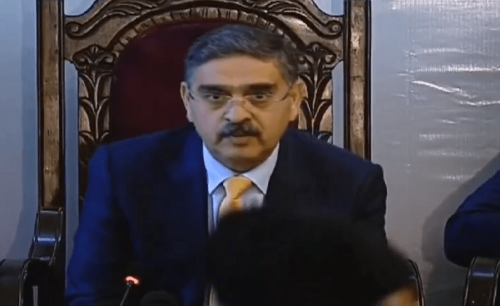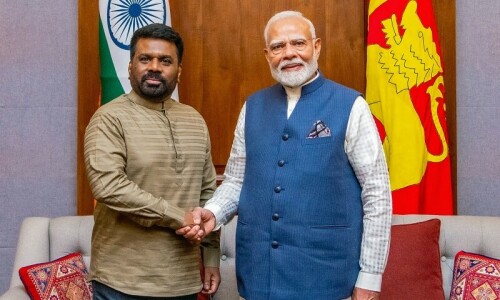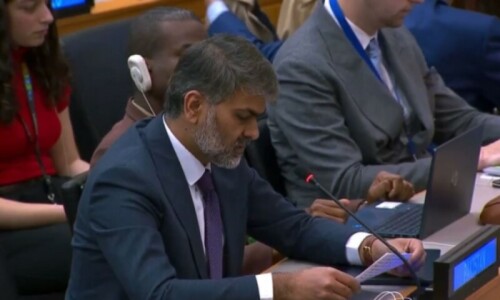ELECTION season is when the bourgeois political class makes all sorts of promises and at the same time says nothing at all. Take, for example, the complete neglect by mainstream politicians of Baloch protesters in Islamabad. They are sitting in front of the National Press Club in the federal capital.
Even if the bigwigs can’t make time to visit, there’s no obvious reason they cannot release a statement of support. Maryam Nawaz had no problem doing photo shoots with missing persons’ loved ones a couple of years ago, but being anti-establishment was in fashion back then.
The ethnic peripheries — Baloch, Pakhtun, Sindhi, Seraiki, Gilgit-Baltistani, Kashmiri — have been treated this way for as long as one can remember. The establishment and most mainstream politicians evince much interest in the lands, scenic highlands, minerals, coastlines, and freshwater lakes of the peripheries, but couldn’t care less for the teeming millions that live there. In fact, the more politically conscious you are and demand access to your own resources, you are considered a threat to development, security, and the state itself.
What about the Punjabi heartland? It is here that consent has been cultivated to sustain Pakistan’s militarised structure of power. The PTI’s rise and fall suggests that this consent has fractured to some extent at least. But our bourgeois political class, or at least those who are now the incumbents, are not going out of their way to build on this.
For as far as the eye can see, most bourgeois politicians in Punjab offer to reproduce everyday life for the vast majority — a life mediated by state institutions like the thana, katcheri and patwari, and dictated by high-caste, moneyed classes who own land, business and peddle social influence. They all claim to be better than their competitor, while throwing in ‘ideological’ rhetoric about religion for good measure.
What can we expect from young people in the Punjabi heartland?
This is how elections are fought and won, especially one that is shaping up to be as rigged (primarily against the PTI) as this one. But social, economic and political life will change little after Feb 8. And the political and intellectual mainstream will acknowledge our deep, structural crises in knee-jerk fashion only when necessary.
The burning of the ethnic peripheries will represent the most acute form of these interrelated crises and will be forced into the public eye again and again, largely because of politically conscious youth that refuse to stay silent about their plight. But what can we expect from the majority of this country’s young people who reside in the Punjabi heartland?
It is true that to be young and from the Punjab means that one has better chances at social mobility than if one is young and hails from virtually any other ethnic-national community in Pakistan. But class war plays out in Punjab too, where millions of children are out of school, workers and peasants face dispossession and live in semi-serfdom, and all sorts of health problems play out alongside environmental despoliation.
Other than the very well-off, most Punjabi youth — many who have been taken by the PTI and Imran Khan — continue to suffer the cumulative economic effects of the pandemic and IMF-imposed austerity, as well as the hyper-financialised and consumption-based economic model that prevails in Pakistan today.
In short, that there is simply not enough gainful and dignified employment available for the number of young people seeking jobs, let alone housing, health, education and recreation. The most coveted option is to leave the country by hook or crook, but even that is an option for a very small percentage of the population.
I believe that a growing number of young people in Punjab do understand that the establishment-centric system offers them only hateful rhetoric, and in fact, subjects many to military-led dispossession. It is also noteworthy that more are speaking about deep injustices in faraway places like Palestine as well as the ethnic peripheries in Pakistan.
The next step is to understand that political commitment is not about following a Pied Piper to the ends of the earth. It is about coming to terms with the causes (rather than the symptoms) of the predicament one faces, and then having the wisdom to make common cause with all others concerned with building a different future.
The future for Punjabi youth — especially those lower down the class ladder — is not as bleak as some others but it certainly is not great. The young Baloch women protesting peacefully in Islamabad for their loved ones have said they seek to make common cause with the ordinary people of Punjab. Our collective future will be shaped by how Punjab’s increasingly politically conscious young people respond in the due course of time.
The writer teaches at Quaid-i-Azam University, Islamabad.
Published in Dawn, January 5th, 2024















































